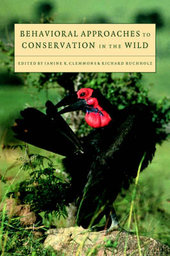
|
Behavioral Approaches to Conservation in the Wild
Hardback
Main Details
| Title |
Behavioral Approaches to Conservation in the Wild
|
| Authors and Contributors |
Edited by Janine R. Clemmons
|
|
Edited by Richard Buchholz
|
| Physical Properties |
| Format:Hardback | | Pages:404 | | Dimensions(mm): Height 235,Width 158 |
|
| Category/Genre | Animal behaviour
Management of land and natural resources |
|---|
| ISBN/Barcode |
9780521580540
|
| Classifications | Dewey:639.9 |
|---|
| Audience | | Professional & Vocational | |
|---|
| Illustrations |
8 Tables, unspecified; 2 Halftones, unspecified; 37 Line drawings, unspecified; 8 Tables, unspecified; 2 Halftones, unspecified; 37 Line drawings, unspecified
|
|
Publishing Details |
| Publisher |
Cambridge University Press
|
| Imprint |
Cambridge University Press
|
| Publication Date |
28 January 1997 |
| Publication Country |
United Kingdom
|
Description
Today's conservation literature emphasises landscape ecology and population genetics without addressing the behavioural links that enable the long term survival of populations. This book presents theoretical and practical arguments for considering behaviour patterns in attempts to conserve biodiversity. Prominent scientists and wildlife managers are brought together in this volume to address a number of issues, including the limits and potentials of behavioural research to conservation, the importance of behavioural variation as a component of biodiversity, and the use of animal behaviour to solve conservation problems and provide specific direction for research and management practices. The book is unique by emphasising conservation of wild populations as opposed to captive and reintroduced populations, where behavioural research has concentrated in the past. The variety of expertise in this volume demonstrates that the complete ethological framework, not just behavioural ecology, provides valuable techniques and knowledge for conserving biodiversity.
Reviews'There is a lot of information brought together which has not been accessible in one volume, nor presented in this way before. I believe this is a valuable read in particular for students of animal behaviour. Forget about whether you are in the behaviourists' or conservationists' camp, if you are unsure whether this book is of interest to you, read any one of the chapters 9-14 and you are sure to find out.' Gillian Gilbert, Animal Behaviour 'Conservation biologists who read this volume will find it very inspiring.' Matthew H. Godfrey, Trends in Ecology and Evolution 'If this book did not exist, it would need to be written ... a single book rarely changes scientific cultures, but it may be a starting point for more exchange between the disciplines. It provides a series of arguments why, in its ever increasing importance, conservation work should not be done (and actually cannot be done) without expertise in the field of behavioural mechanisms and functions. This book is therefore essential not only for ethologists, but is necessary for any decision-maker in wildlife management and conservation.' Ethology
|